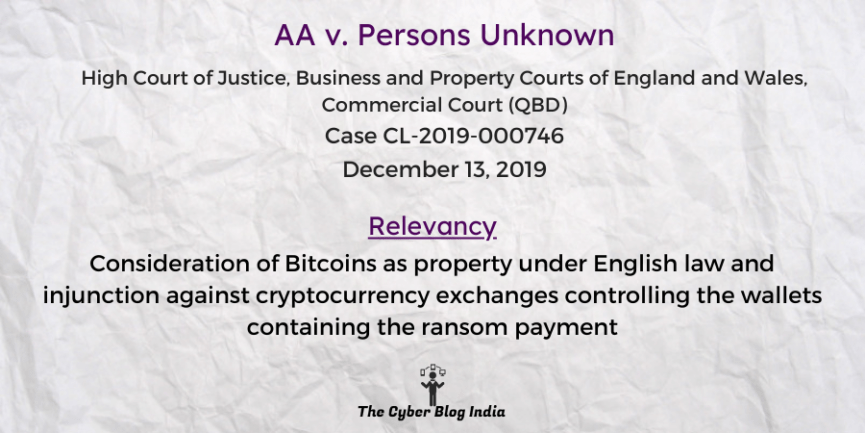AA v. Persons Unknown

AA v. Persons Unknown
[2019] EWHC 3556 (Comm)
In the High Court of Justice, Business & Property Courts of England and Wales, Commercial Court (QBD)
Case CL-2019-000746
Before Justice Bryan
Decided on December 13, 2019
Relevancy of the Case: Consideration of Bitcoins as property under English law and injunction against cryptocurrency exchanges controlling the wallets containing the ransom payment
Statutes and Provisions Involved
- The Human Rights Act 1998 (Section 12(2), 12(3))
- The Civil Jurisdiction Judgments Act 1982 (Section 25.1)
- The Bankruptcy Act 1883 (Section 44)
Relevant Facts of the Case
- The first defendant, a hacker, unlawfully gained access to a Canadian insurance company’s IT system, the claimant.
- The hacker demanded a Bitcoin ransom in exchange for the decryption software needed to regain access to the claimant’s data and systems.
- The claimant paid the first defendant $950,000 in Bitcoins and slowly recovered the access.
- A tracing examination found that a significant amount of the Bitcoins was sent to a specific wallet or address associated with the Bitfinex exchange. The third and fourth defendants operate this cryptocurrency exchange.
Prominent Arguments by the Counsels
- The claimant’s counsel argued that the court must grant a Bankers Trust relief. This would require the third and fourth defendants to provide specific information related to cryptocurrency transactions. Alternatively, the court can also grant a proprietary or freezing injunction concerning Bitcoins held at specific accounts of third and fourth defendants.
Opinion of the Bench
- The court agreed to hear the matter privately as a public hearing would defeat the object of hearing. It would alert the persons unknown who took the ransom to dissipate the Bitcoins. Further, it would also increase the risk of cyber revenge attacks.
- Blackmail is in itself a misuse of free speech. Therefore, a private hearing would allow further information leaks and losses. Also, it is an appropriate case for not notifying the first and second defendants.
- For an object to be considered property under English law, it shall satisfy the following four conditions: definable, identifiable by third parties, having some degree of permanence, and capable in their nature of assumption by third parties. Therefore, Bitcoins can be considered property under English law.
Final Decision
- The court granted the claimant a proprietary injunction. However, the court adjourned the applications for the Bankers Trust relief and worldwide freezing injunction.
Anjini Pandey, an undergraduate student at Dr. Ram Manohar Lohiya National Law University, and Linet Christina Thomas, an undergraduate student at Lords Universal College of Law, prepared this case summary during their internship with The Cyber Blog India in May/June 2022.
